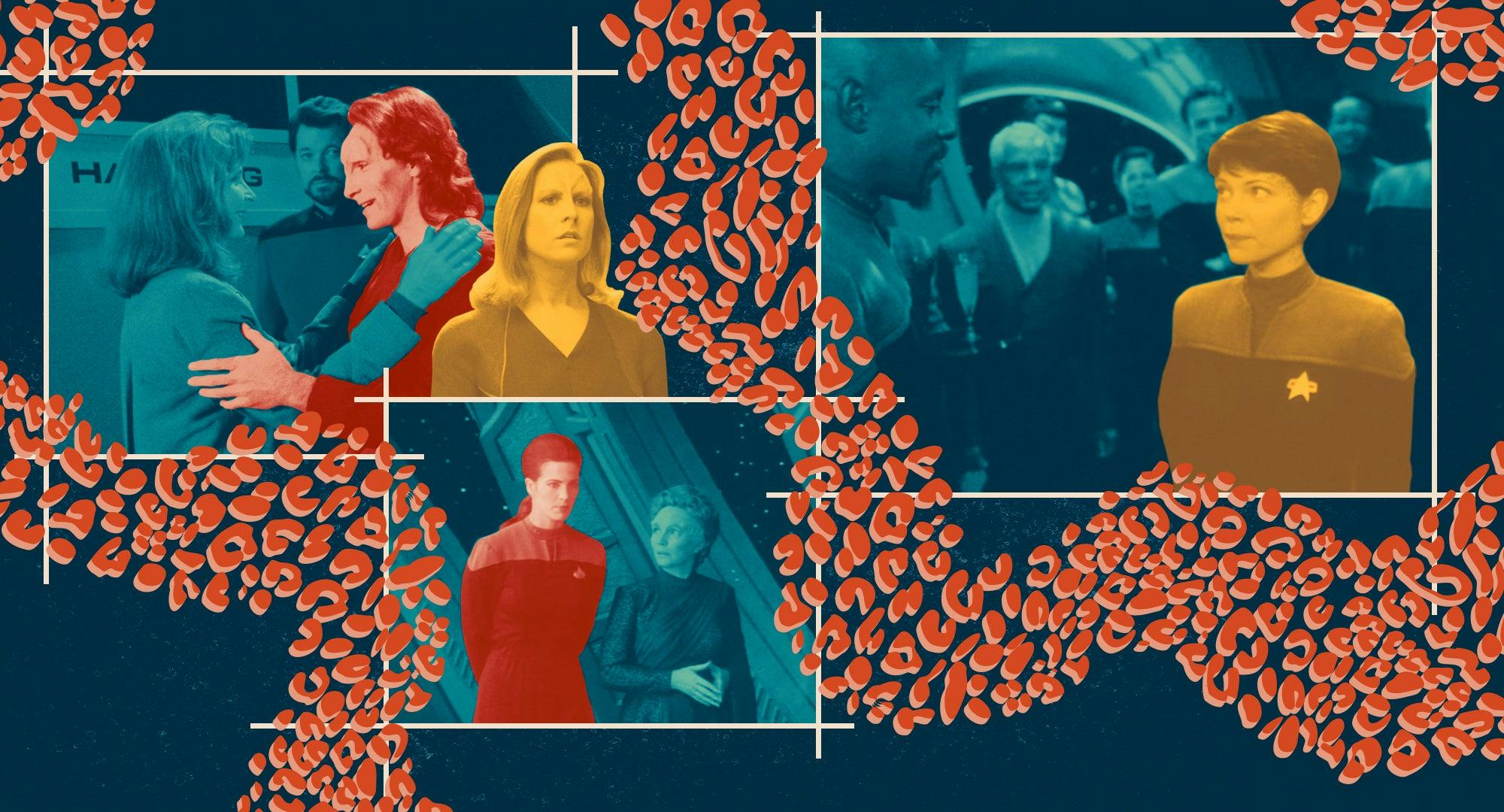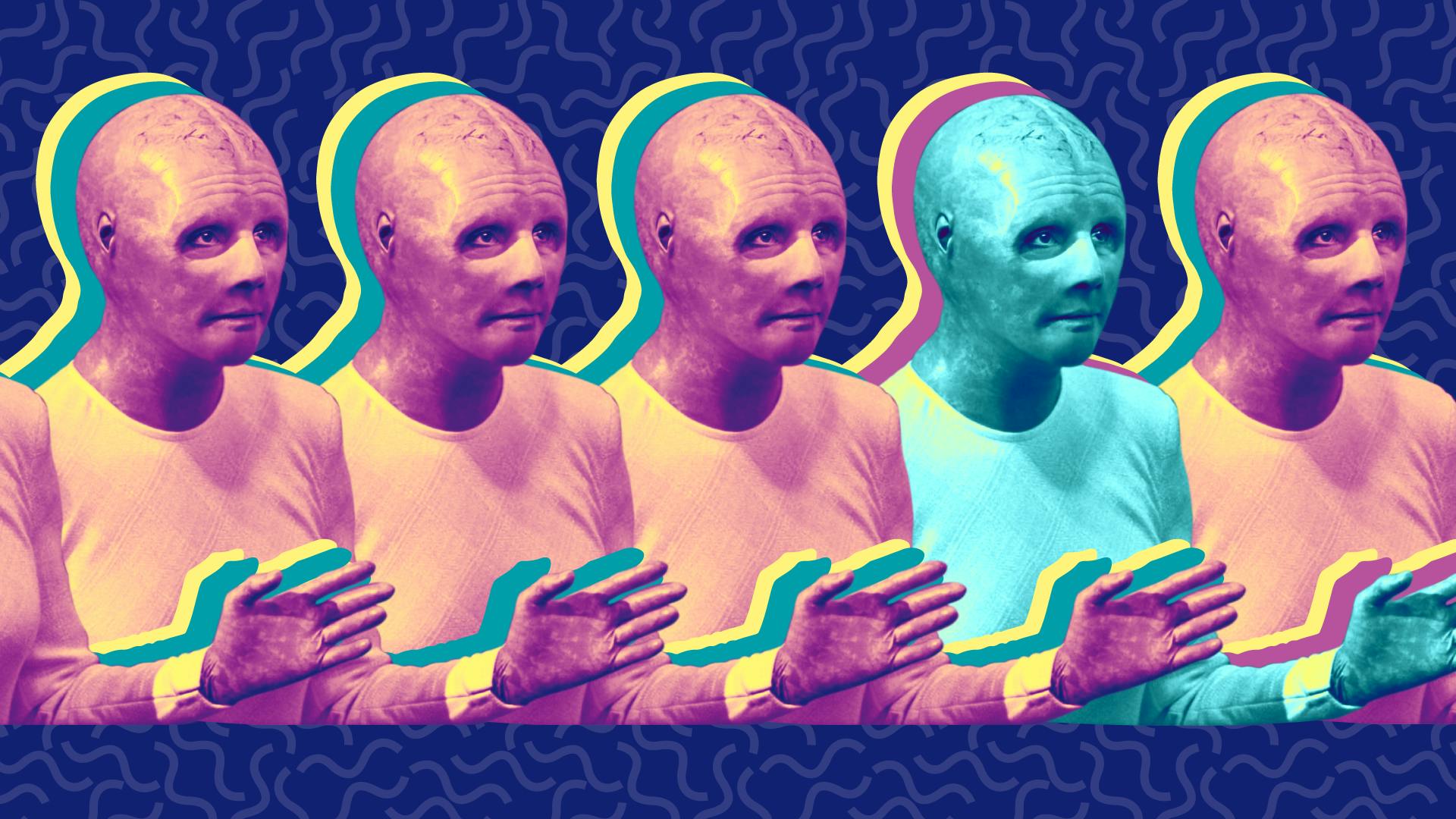Published Aug 15, 2019
A Trip to the Pleasure Planet
Two friends with a unique perspective sit down for a chat about the various fantasies that make Risa so special.

StarTrek.com
Danny Mallory Ortberg and Colette Arrand, two friends of varying transsexual types, sit down for a chat about the pleasure planet Risa, and to ask just how many times a man can get “tricked” by aliens disguised as beautiful women before the whole planet qualifies as a force-femme fantasy.
Danny Mallory Ortberg: Colette! I see that you have the horga’hn prominently displayed outside of your quarters, signaling your receptivity to a conversation about the transexual power-exchange fantasy that is Risa. I seek whatever you’ve got! Do you remember the first time you heard about the mysteries of the pleasure planet?
Colette Arrand: When it comes to this kind of conversation, I’m always receptive. Like many, the first time I really thought of Risa was the Star Trek: The Next Generation episode “Captain’s Holiday,” where Captain Picard is forced to go on vacation there by his crew and tricked into displaying a horga’hn by Commander Riker, which leads to — as most attempts to get Jean-Luc to relax do — an archaeological dig. The possibilities of pleasure planets, the tangible realities of them, had been explored before on Trek, but not quite with the frankness of that episode, where Picard just wants to read James Joyce but finds himself constantly rebuffing the prospect of jamaharon with the locals. For reasons that we’ll touch on later, that’s still my most memorable trip. How about you?

"Captain's Holiday"
StarTrek.com
Danny Mallory Ortberg: Same episode! In my memory at least, Picard is always saying “I need a vacation... from this vacation!” Throughout the episode he embodies the “miscast and long-suffering straight man trapped inside an 80s sex hijinks comedy” trope better than anyone else in Star Trek history. That episode really sets the tone for me (apparently Gene Roddenberry wanted to incorporate a lot of explicit gay sex but got shut down), because there’s almost always the counter-fantasy of being “tricked” on the Risa episodes – Picard is tricked by Riker into displaying sexual availability; on Star Trek: Enterprise, Tucker and Reed get tied up in their underwear by two thieves in “disguise” as hot Risian ladies in one of the most obvious/stale trans panic scenarios; Janeway, on Star Trek: Voyager, talks about Risa via that super-common '80s-era urban legend about a businessman waking up in a bathtub after a night with a beautiful seductress only to find out he’s missing a kidney… there’s something about Risa that always brings up this fantasy (desire? fear? hope?) of opening the door to pleasure a little bit so that someone will overpower or outthink you into giving up more than you’d intended. Do you know what I mean?
Colette Arrand: I think I do! The only show that lets its crew loosen the reins a little is Deep Space Nine, and even then you’ve got Worf’s displeasure about the seeming ease of life on the planet, an illusion created by a weather control system without which Risa would be the Federation equivalent of Ferenginar. Since humans are often our touchstone, that tug-of-war between fear and desire makes a lot of sense — even in a post-scarcity society, we’re so predisposed towards work (which, one hopes, is something done towards a clear goal) that letting off a little steam is an uncomfortable prospect. Who are we when we’re not working? What are we capable of when we’re told to enjoy ourselves without remorse?
To return to “Captain’s Holiday,” I had no idea that Roddenberry wanted the planet to be explicitly okay with the idea of gay desire, but I’ve always read the episode as one with a queer heart, despite Picard ending up with Vash in the end.
Danny Mallory Ortberg: I mean, in some ways the whole history of Star Trek is like: Something is almost explicitly gay, then, at the very last second, isn’t. This isn’t a new thing, obviously. There’s a long history of queerness-through-metaphor in science fiction, Star Trek in particular. The sort of caginess or withholding-ness that results from almost writing something or someone canonically trans/bi/gay into a story is really interesting. And so you can end up with this weirdly wholesome, weirdly straight planet that’s supposedly dedicated to pure pleasure and experimentation that sort of… shorts out that withholding structure. So Risa stories almost always involve some sort of brainwashing, or mind control, or memory loss, because they have to stop imagining something, but they can’t say what they’re not willing to imagine. Risa ends up being, weirdly, this very repetitive, limited, restrictive place.
Colette Arrand: Right! Re-watching “Captain’s Holiday,” I was reminded of my experience as a closeted person in college. My friends watched me read books and write poetry and listen to Belle and Sebastian, and they figured that what I needed was a girlfriend, so they signed me up for OKCupid. I was … not comfortable with this. Being forced to dabble with the idea of sex as someone who was, then, uncomfortable with their sexuality and gender identity felt like learning, to my horror, that my friends perceived me as straight! And it kept happening for years! I was really buttoned up about it, the way Picard is in the episode, constantly surrounded with the fantasies of others, the fantasies other people held for me, without an ideal outlet for any of it. Eventually, like Picard finding a cave to dig a hole in, I found the outlet I needed, and was able to open myself up to the idea of being someone capable of desire and being desired. Risa functions as a door to that possibility for these characters, but it’s ultimately up to them to step through it. That most of them do — and in ways that speak so truly to human nature — is one of the small, delightful surprises of the series.
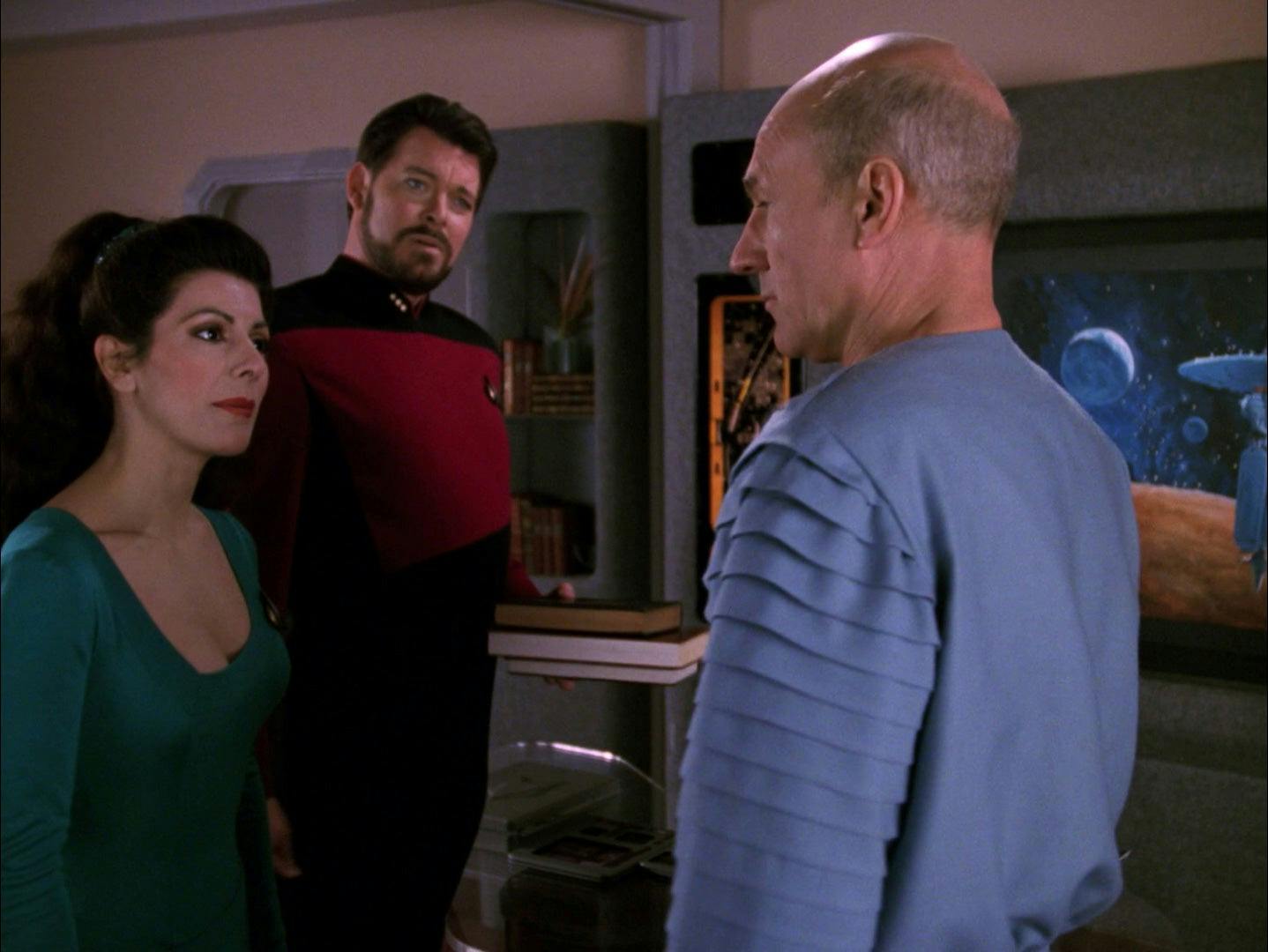
"Captain's Holiday"
StarTrek.com
Danny Mallory Ortberg: There’s certainly an argument to be made for Picard as like… the universal X representing all types of closet cases. No one does Best Little Boy In The World syndrome like Picard. Whereas Riker is always champing at the bit to go back and get “accidentally” mind-controlled by another beautiful lady (remember when Ashley Judd brainwashed him and the rest of the crew with an addictive video game??). Right before Picard transports down to Risa, Riker and Troi visit him in his quarters, and Riker starts giving him a hard time for packing books to bring with him (His closeted-ness radiates outwards rather than inwards!).
RIKER: Ulysses by James Joyce? Ethics, Sophistry and the Alternate Universe by Ving Kuda? You call that light reading?
PICARD: To each his own, Number One.
RIKER: Have I mentioned how imaginative the Risian women are, sir?
TROI: Too often, Commander.
Obviously, the whole point of sexual innuendo is what you don’t name, but the whole thing about Riker’s line here is that he’s always threatening to go on and on about the crazy shit he gets up to on Risa, but he never does. Somebody always shuts him down, the scene always cuts out; what can Risian women imagine that we can’t? The same reason we have a holodeck and no transsexuals. Fade to black.
Colette Arrand: Presumably there are no transsexuals due to the ease with which one can undergo surgery and that, in the 24th century, the only way you’re weirded out by the idea of falling in love with a trans person is if they’ve got a worm in their belly, but yeah, Riker is absolutely that guy who goes to all of these hedonistic places on vacation and comes back, eyebrows raised for a week, but won’t say anything other than “What happens on Risa stays on Risa.” His relationship to the planet is, in that sense, the most normal? He’s absurdly proud of his sexual prowess, but the details he offers are so vague that the liaisons we don’t see have all the weight of a high school boy’s Canadian girlfriend. He’s like an enthusiastic chaser who only sleeps with trans people when he’s traveling.
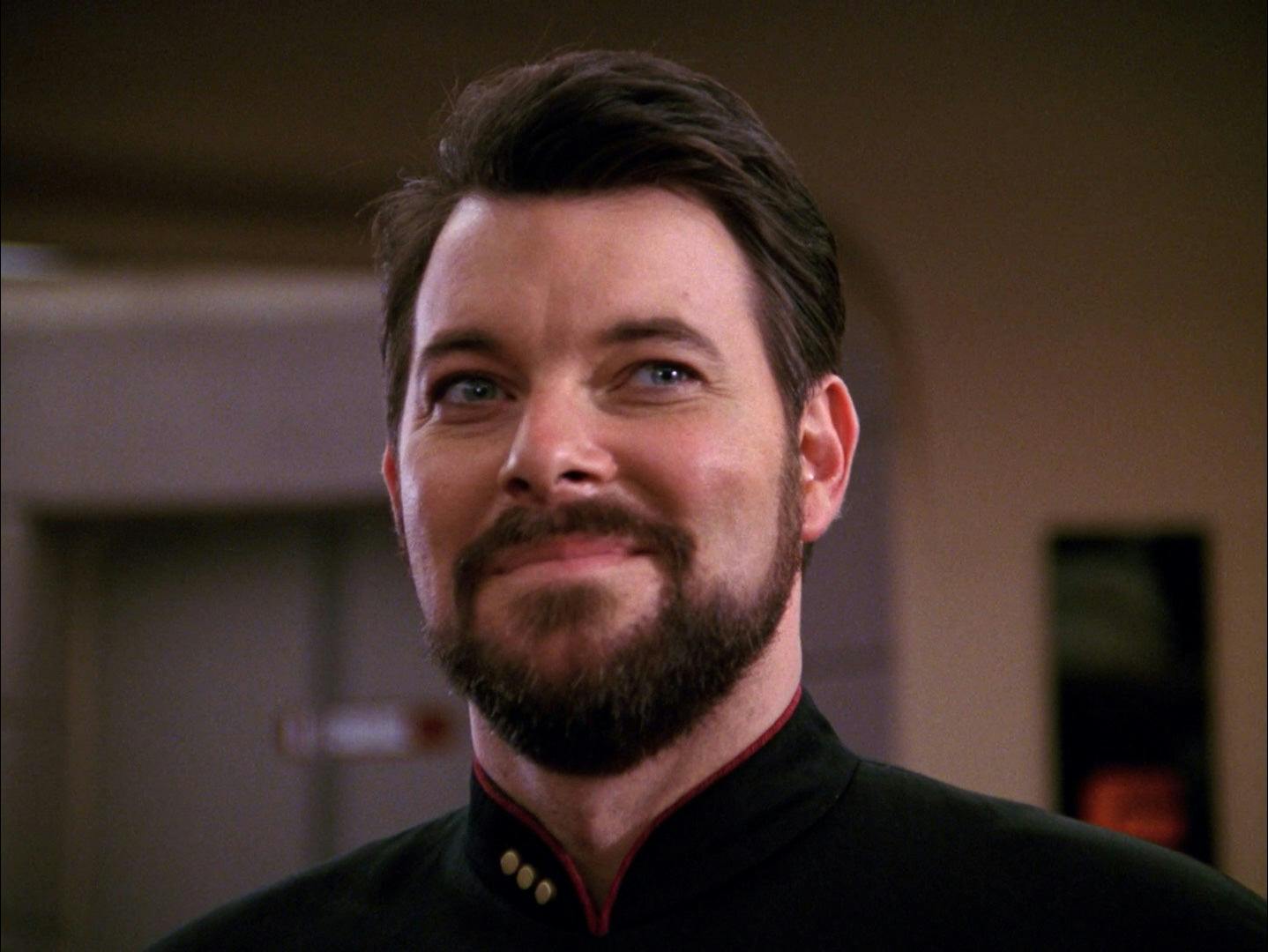
"Captain's Holiday"
StarTrek.com
Danny Mallory Ortberg: Yes! I kind of love that particular form of avoidance – “Sorry, you just missed all the gay and trans people, they’re totally banal now, so we don’t have any.” We were talking a bit offline about whether Riker tracks most legibly as an omnisexual trans dude or super-enthusiastic chaser and you said, “My man is a chaser through and through. He’s ‘proud to be trans-amorous,’” and I can definitely picture him wearing that as like, a lapel pin.
Colette Arrand: A horgha’hn that signals that he is receptive to jamaharon with a pre-op TS.
Danny Mallory Ortberg: Jesus. Yes. I know this to be true deep in my bones.
Colette Arrand: Speaking of the Trill, we’ve somehow gotten this far without getting into the specifics of Jadzia Dax and Worf’s trip to Risa. To a lot of trans Star Trek fans, Dax is a kind of aspirational figure, and her relationship to Worf is, depending on who you ask, either one of the best cis/trans relationships in television, or one of the best MTF/FTM relationships in television. Does “Let He Who Is Without Sin...” scan as a particularly trans episode to you? Does that character? That relationship? How is that embellished by the episode?
Danny Mallory Ortberg: I’d like to begin by meditating on this picture of Jadzia with Dax’s ex-lover Arandis, doing what can only be described as ghosting.
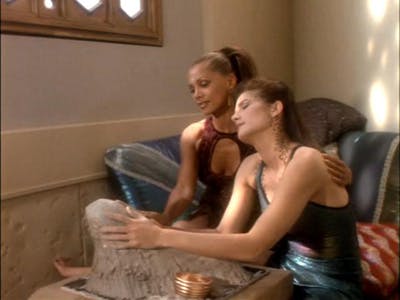
"Let He Who Is Without Sin..."
StarTrek.com
Colette Arrand: The idea that they’re going to get a functional pot out of what they’re doing is preposterous.
Danny Mallory Ortberg: They are clearly working on a sculpture of the two of them making a sculpture together! Yeah, Jadzia Dax is absolutely one of Star Trek’s most interesting workaround of the “gay but without saying gay” problem – I feel like there’s an absolute parade of Curzon’s beautiful exes and the question is always, “So is she going to get back together with any of them and be gay now?” and the answer is always “Not exactly, but stay tuned.” And the big reveal that Worf can’t open up about what’s really bothering him because when he was 13 he accidentally killed another kid playing soccer too vigorously is incredibly melodramatic, and maps onto a T4T reading pretty easily – “When I hit puberty, I realized that going after the things I wanted would cause death and despair, so I’ve held myself in tightly ever since” – and slightly ridiculously. Which I like! Sincerity coupled with the ridiculous feels very T4T.
Colette Arrand: Not to mention the way Worf grapples with being a Klingon raised by humans! He’s obsessed with being a Good Klingon, the way a lot of trans men fritter over what it means to be a Good Man. Dax has had seven transitions in their lifetime and moves through the world with an easy confidence. Seeing her partner struggle with his identity is horrible, but unlike with Picard, confronting that discomfort leads to a major breakthrough for their relationship. Which also scans as T4T for me — as in, how serious and introspective our conversations are when we’re away from the places we call home. It’s not entirely relaxing, but it is certainly invigorating.
Danny Mallory Ortberg: Everyone comes home from Risa a little wiser for the wear! Usually with a secret too – something they can’t say out loud, or won’t, or can’t say yet, because that built-in imagination-limit exists everywhere, not just planet-side. But then, there’s always the promise of another visit.
Colette Arrand: Or, you know, the threat of being kidnapped on your way there, or coming back from shore leave minus a kidney. But those are learning experiences, too. You can replace a kidney. You can’t learn whatever it is that jamaharon teaches unless you’re open to jamaharon.


